Achieving clearer skin can be an uphill battle, especially for individuals with delicate, easily irritated skin. Finding an acne treatment for sensitive skin requires a careful balance between potency and gentleness, where the right formulation can alleviate breakouts without triggering redness, dryness, or inflammation. As the skincare industry continues to expand, the volume of acne treatment products on the market can overwhelm even the most diligent consumer. This guide aims to demystify the process of selecting a safe and effective acne solution by providing evidence-based advice, practical tips, and expert-level insights tailored specifically to the challenges faced by those with reactive skin. Whether you are navigating over-the-counter options or exploring dermatologist-recommended acne prescription creams, the goal is to support your journey toward healthy, resilient skin with scientifically backed solutions that prioritize both efficacy and skin integrity.
You may also like: How Retinol Helps with Dark Spots: Before and After Results Backed by Dermatology Experts
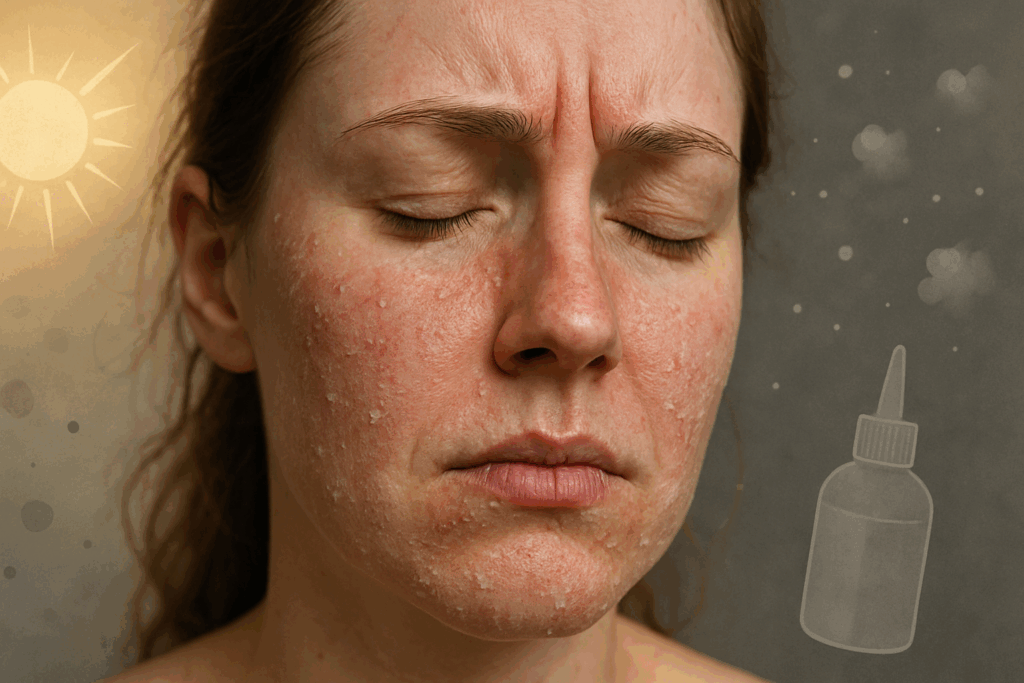
Understanding Sensitive Skin and Acne: The Delicate Balance
Before diving into specific treatments, it’s crucial to understand the nature of sensitive skin and how it complicates the acne healing process. Sensitive skin tends to overreact to environmental triggers, harsh ingredients, and even some therapeutic agents. It is often characterized by redness, burning sensations, flakiness, or a tight, uncomfortable feeling after product application. These symptoms reflect a compromised skin barrier, making it more susceptible to irritation from even common acne-fighting agents like salicylic acid or benzoyl peroxide.
This fragility becomes especially problematic when dealing with acne, which itself is a complex dermatological issue caused by clogged pores, excess sebum, inflammation, and bacterial growth. In individuals with sensitive skin, the inflammatory response can be more intense and longer-lasting, which exacerbates blemishes and hinders healing. Moreover, many conventional acne medications—designed for rapid exfoliation and oil control—can strip the skin’s protective lipids, further weakening the barrier. The solution lies in choosing products with lower concentrations of active ingredients, soothing botanical additives, and non-comedogenic bases that can treat acne while preserving the skin’s natural defenses.
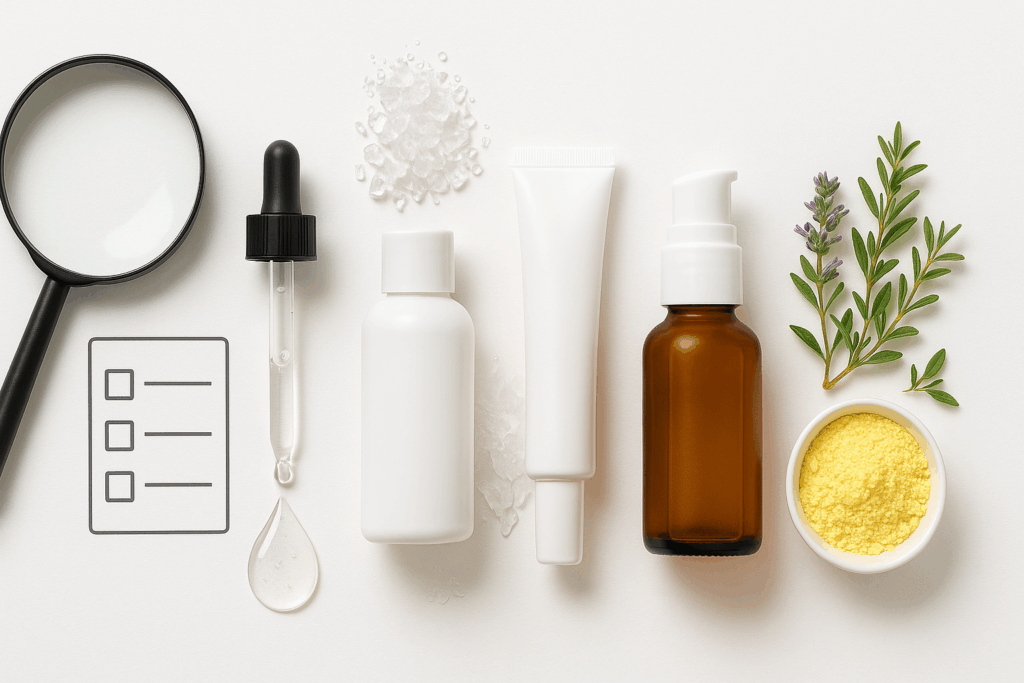
How to Identify the Best Acne Treatment for Sensitive Skin
Selecting the best acne treatment for sensitive skin means adopting a methodical and educated approach. Start by examining product labels for common irritants such as alcohol, synthetic fragrances, sodium lauryl sulfate, and harsh preservatives. These ingredients may seem harmless but can severely disrupt the balance of already fragile skin. Next, focus on gentle yet effective actives like niacinamide, azelaic acid, or sulfur, which provide antimicrobial and anti-inflammatory benefits without the stinging effects of stronger exfoliants.
Another consideration is formulation. Gel-based products may be more suitable for oily-sensitive skin, while creams or lotions are better for those with dry-sensitive types. Choosing non-foaming, hydrating cleansers and barrier-repairing moisturizers to accompany your acne regimen can significantly reduce the risk of irritation. Also, avoid multi-treatment stacking, such as using multiple acne spot treatments simultaneously, as this increases the potential for negative interactions and barrier breakdown. Instead, a streamlined, minimalistic approach using one or two active ingredients—at tolerable strengths—is usually more effective for sensitive skin.
Spotlight on Key Active Ingredients for Sensitive Skin
The skincare market is saturated with ingredients promising fast results, but not all are suitable for delicate skin. When choosing an acne treatment for sensitive skin, it’s essential to understand which actives offer the highest therapeutic benefit with the least irritation potential. Niacinamide, a form of vitamin B3, is a powerhouse in this regard. Known for its anti-inflammatory and oil-regulating properties, it helps minimize the appearance of pores, reduces redness, and strengthens the skin’s moisture barrier—all without causing dryness or peeling.
Azelaic acid is another standout. This naturally occurring compound not only combats acne-causing bacteria but also addresses hyperpigmentation and uneven skin tone, common issues in acne-prone skin. It has a mild keratolytic effect, which means it encourages the turnover of skin cells without the aggressive exfoliation seen in alpha or beta hydroxy acids. For those who prefer botanical solutions, tea tree oil and green tea extract provide antimicrobial and calming effects, although their concentration must be carefully controlled to avoid sensitization. Meanwhile, sulfur-based treatments offer an excellent alternative to traditional acne spot treatments, delivering antibacterial effects while absorbing excess oil—ideal for inflamed pimples and oily T-zones.
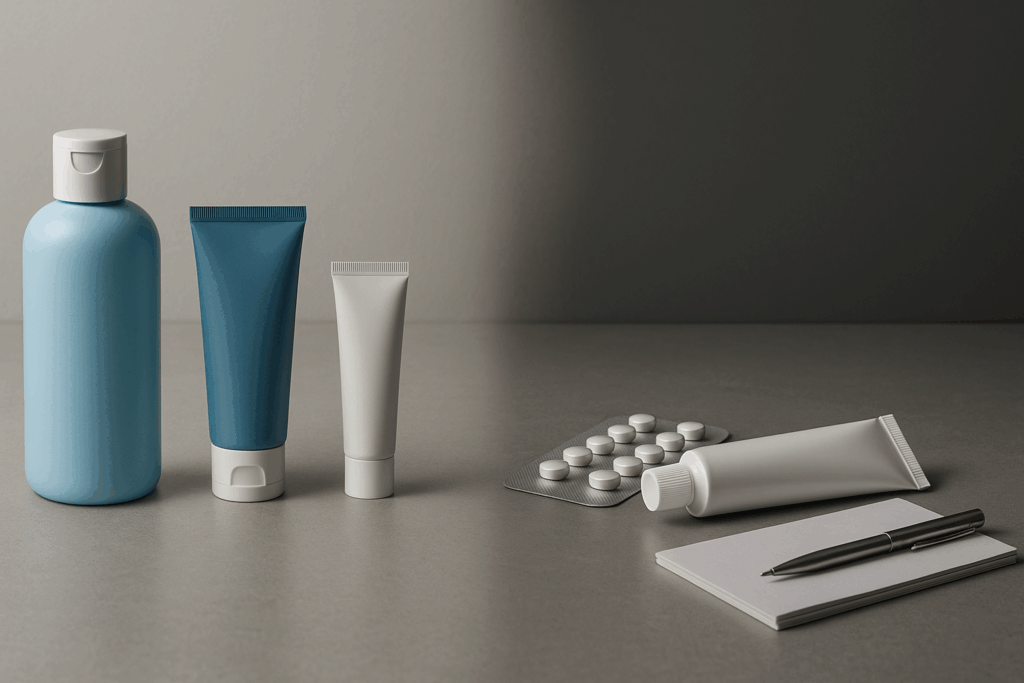
Over-the-Counter vs. Prescription Acne Medication: What’s Best for You?
The choice between over-the-counter (OTC) and prescription acne medication can be confusing, particularly for individuals with sensitive skin. OTC products, such as those containing benzoyl peroxide or salicylic acid, offer a broad spectrum of options with varied concentrations. For mild to moderate acne, these can be effective when used appropriately. However, the best over the counter benzoyl peroxide options for sensitive skin are usually formulated with a lower percentage—typically 2.5%—and buffered with emollients or humectants to mitigate dryness.
Prescription options open up a wider range of acne treatment products, including retinoids like adapalene or tretinoin, antibiotics such as clindamycin, and combination therapies that pair antimicrobial agents with anti-inflammatories. While these medications can be highly effective, they also come with a higher risk of irritation, making them suitable only when guided by a dermatologist. For those struggling with hormonal or cystic acne, prescription acne medication for adults, including oral treatments like spironolactone or certain birth control pills, may offer systemic relief that topical products cannot achieve. It is crucial to weigh the potential benefits against the risk of sensitization, always starting with the lowest tolerable dose and gradually increasing under professional supervision.
Exploring Acne Pills and Oral Treatments for Sensitive Skin
Topical treatments aren’t always enough, particularly in cases of persistent or severe acne. For individuals who experience deep, painful nodules or widespread breakouts, oral therapies—commonly referred to as acne pills—may be a viable option. These include antibiotics like doxycycline and minocycline, hormonal regulators like oral contraceptives, and anti-androgen medications such as spironolactone. Each works through different mechanisms to reduce inflammation, decrease sebum production, and limit bacterial colonization.
However, individuals with sensitive skin should approach these medications with caution. While systemic treatments do not directly irritate the skin’s surface, they can lead to other side effects, including gastrointestinal upset, sun sensitivity, and hormonal fluctuations. Moreover, the use of antibiotics for extended periods can disrupt gut microbiota, which in turn can indirectly impact skin health. Therefore, it is essential to have these treatments closely monitored by a healthcare provider and complemented with gentle, skin-supportive topical regimens. Patients should also inquire about emerging therapies like probiotics or zinc supplementation, which may offer systemic anti-acne benefits with fewer side effects.
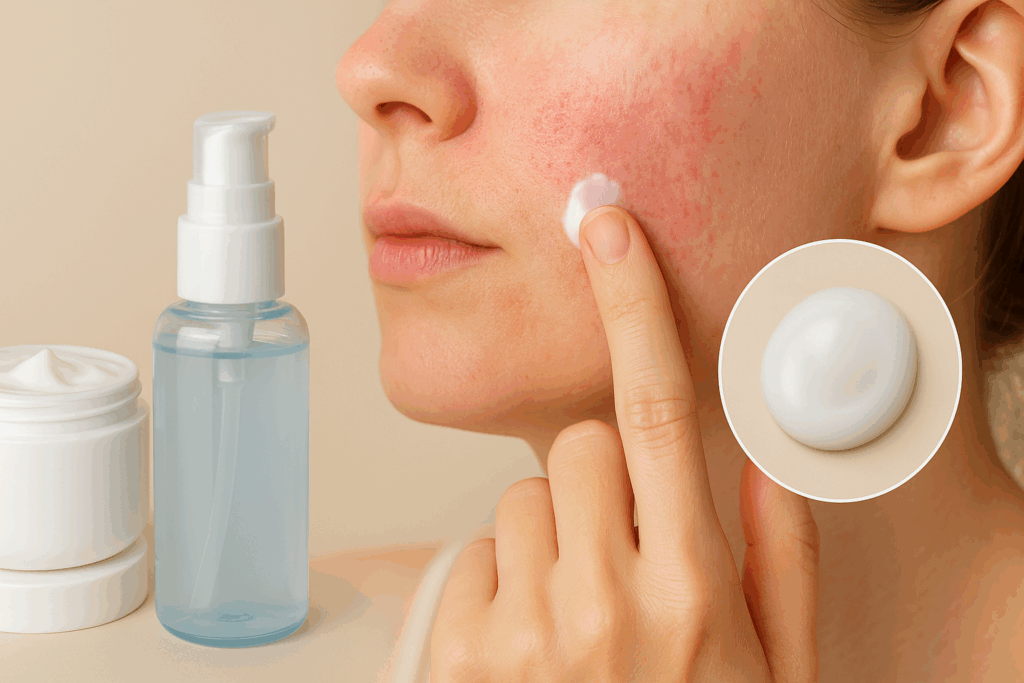
Finding the Best Acne Cream for Sensitive Skin: A Tailored Approach
Navigating the sea of creams available on drugstore shelves and online platforms can be daunting. The best acne cream for sensitive skin is one that addresses breakouts while simultaneously hydrating and protecting the skin barrier. Formulas containing ceramides, hyaluronic acid, or squalane can counteract the dryness often induced by acne-fighting agents, making them ideal bases for treatment creams. For instance, acne cure creams containing encapsulated retinol or lower-strength benzoyl peroxide are designed to release actives slowly, minimizing the irritation associated with more aggressive formulations.
It is also important to differentiate between creams intended for daily use and those meant for spot application. While an all-over acne treatment cream can help prevent future breakouts, a targeted approach using the best pimple spot treatment ensures localized action with minimal disruption to unaffected areas. Additionally, look for products labeled as “non-comedogenic,” “hypoallergenic,” and “dermatologist-tested,” as these designations suggest a lower risk of triggering adverse skin reactions. Brands that cater specifically to sensitive skin types often formulate with this dual-purpose objective in mind, offering both therapeutic efficacy and long-term skin support.
Choosing the Best Products for Acne Without Compromising Skin Health
With so many options on the market, it’s easy to fall into the trap of over-treating your skin. Yet when it comes to selecting the best products for acne, simplicity is often key. A well-rounded regimen for sensitive skin typically includes a gentle cleanser, a barrier-repairing moisturizer, a broad-spectrum sunscreen, and one or two targeted treatment products. Overloading your routine with too many actives or layering incompatible formulas can backfire, leading to inflammation and rebound breakouts.
For effective results, consistency and patience are critical. Many of the best top 3 acne products, such as a benzoyl peroxide cleanser, a niacinamide serum, and a hydrating gel moisturizer, take weeks to show full results. This delay can be frustrating, but it is a necessary part of the skin’s renewal cycle. Supplementing topical care with healthy lifestyle habits, such as a low-glycemic diet, regular sleep, and stress management, can amplify the effectiveness of your acne treatment. And if your skin shows signs of worsening despite your efforts, it may be time to consult a dermatologist who can customize a prescription acne medication plan tailored to your specific skin profile.
Best Acne Treatment for Sensitive Skin: What to Look for in Spot Treatments
When breakouts strike, a fast-acting solution is often needed to reduce swelling and promote healing. Spot treatments are designed to deliver concentrated doses of acne-fighting agents directly to individual blemishes, offering a more localized alternative to full-face products. The best acne treatment for sensitive skin in this category typically avoids alcohol and other drying agents, focusing instead on soothing ingredients like chamomile, aloe vera, and colloidal sulfur. These actives provide anti-inflammatory and antibacterial benefits without compromising the surrounding skin.
To further reduce the risk of irritation, opt for spot treatments formulated with lower percentages of benzoyl peroxide or salicylic acid. The best pimple medication and best zit spot treatment options often utilize encapsulated or time-released technology to ensure sustained delivery and minimize sting. Some products also include skin-calming agents such as allantoin or oat extract, which help reduce redness and speed recovery. For night-time use, hydrocolloid patches can be an excellent choice, as they absorb pus and oil while creating a moist environment conducive to healing, all without introducing potentially irritating chemicals.
How to Treat Severe Acne When You Have Sensitive Skin
Severe acne, which may involve nodules, cysts, and widespread inflammation, presents a unique challenge for those with sensitive skin. The usual prescription of strong acne medication such as isotretinoin or high-potency retinoids often leads to peeling, dryness, and a heightened risk of skin barrier damage. While these therapies can be transformative, they must be paired with vigilant skincare practices that prioritize hydration, barrier repair, and sun protection.
To support the skin through intensive treatment, it is essential to build a regimen that includes emollient-rich moisturizers, gentle cleansers free from sulfates, and physical sunscreens that avoid irritating chemical filters. Using a bland, fragrance-free ointment to buffer strong topicals can reduce the risk of adverse reactions. Moreover, if your dermatologist prescribes a strong acne medication, request a customized treatment schedule that phases in the drug slowly. This titration approach helps the skin build tolerance while maintaining its integrity. Complementary therapies such as blue light treatments or chemical peels using lactic acid can offer non-inflammatory alternatives for managing severe breakouts with minimal irritation.
What Will Dermatologist Prescribe for Acne in Sensitive Skin Types?
When you visit a dermatologist for acne, especially with a sensitive skin profile, the prescription pathway is often different from that given to individuals with resilient skin. The focus shifts toward treatments with a favorable side effect profile and proven anti-inflammatory capabilities. Common first-line therapies include low-dose topical retinoids like adapalene, often combined with a topical antibiotic to prevent bacterial resistance. The dermatologist may also prescribe azelaic acid-based creams, which serve the dual purpose of acne reduction and hyperpigmentation control.
For more stubborn cases, dermatologists might recommend oral medications such as low-dose isotretinoin, spironolactone, or hormonal birth control pills—particularly when the acne is hormonally driven. These treatments are usually paired with a barrier-supporting skincare routine that mitigates side effects. Additionally, dermatologists can tailor your treatment plan based on skin testing or in-office evaluations that assess sensitivity thresholds. This allows for a bespoke strategy that minimizes trial and error, saving both time and skin trauma in the long run. With the rise of teledermatology, patients also have quicker access to follow-up care and dosage adjustments, which is vital for maintaining consistent progress.
Understanding What Are Some Good Products to Get Rid of Acne Without Triggering Sensitivity
When researching what are some good products to get rid of acne without aggravating sensitivity, it’s important to consider the entire skincare ecosystem. It’s not just about the one “miracle” product but how all products interact with each other within your routine. A good cleanser, for instance, should not strip the skin but should still remove excess oil and impurities. A serum with calming antioxidants like licorice root or Centella asiatica can further modulate inflammation without exacerbating existing blemishes.
Moisturizers play an underrated yet essential role in acne management for sensitive skin. They serve as both a shield and a conduit—protecting the barrier while allowing actives to work more effectively. Sunscreen, too, is non-negotiable. UV exposure not only worsens post-acne pigmentation but also increases sensitivity. The best acne treatment products will always recommend pairing their use with diligent sun protection. Together, these layers of defense create an environment where acne heals efficiently and recurrences become less frequent.
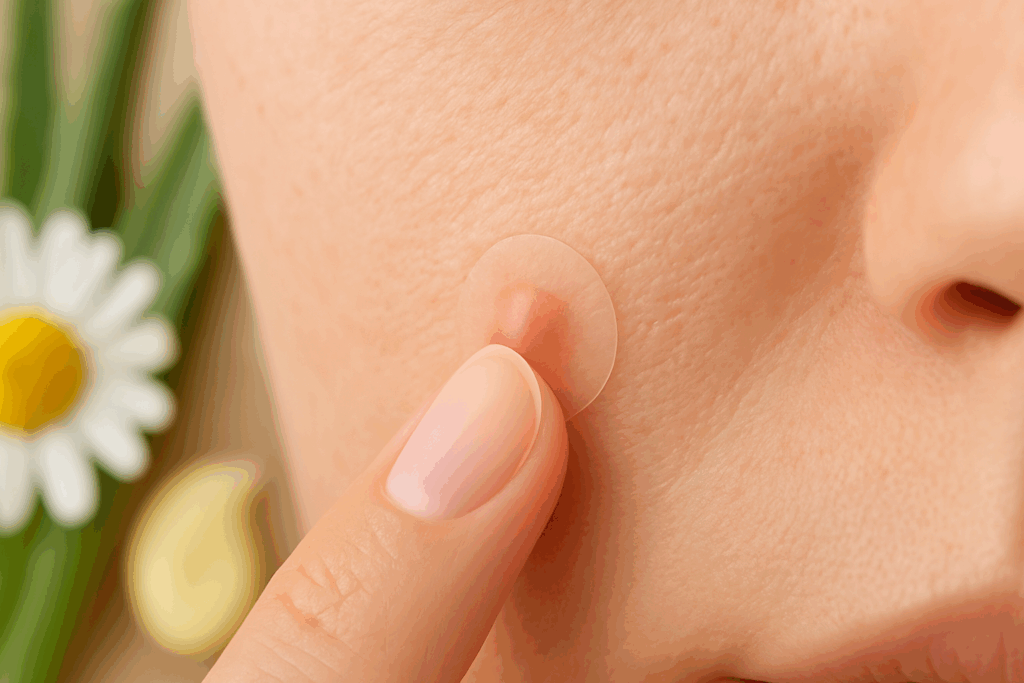
How to Get Rid of Adult Acne While Protecting Skin Barrier Health
Adult acne often has different triggers than adolescent breakouts, including stress, hormonal fluctuations, and cosmetic products. Adults with sensitive skin face the dual burden of treating persistent blemishes while managing age-related concerns like dehydration and barrier dysfunction. The best approach for how to get rid of adult acne in these cases is to choose products that multitask—such as serums with anti-aging peptides and anti-acne actives that do not compromise skin moisture.
Maintaining barrier health means minimizing exfoliation frequency and avoiding abrasive scrubs or alcohol-based toners. Instead, invest in treatments that work below the surface, such as encapsulated salicylic acid, which penetrates pores without irritating the skin’s surface. Professional treatments like microneedling or radiofrequency therapy may also help by reducing inflammation and improving texture without introducing allergens. If you’re seeking the best otc acne medication, focus on products backed by dermatological research and supported by clinical testing for sensitive skin cohorts.
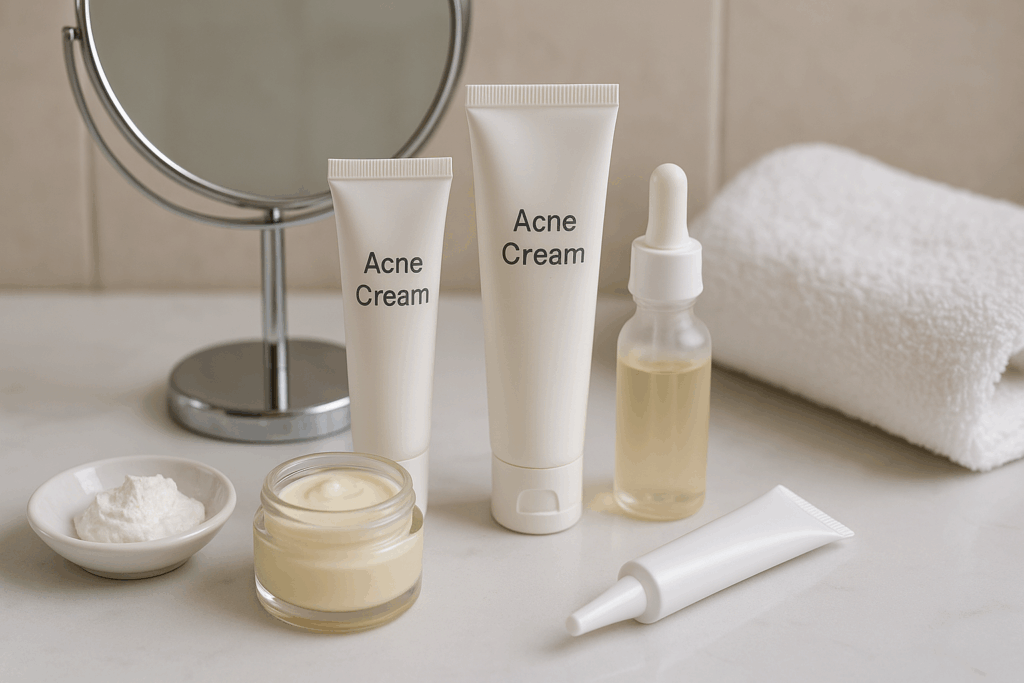
The Best Pimple Creams and Removal Strategies for Lasting Relief
Pimple cream has evolved significantly over the years, moving from harsh, one-size-fits-all solutions to sophisticated, tailored treatments. Today’s best pimple cream formulations are designed to calm, clear, and condition the skin simultaneously. Ingredients like zinc oxide, sulfur, and resorcinol offer targeted relief for inflamed pimples while being less aggressive than high-concentration benzoyl peroxide. These options are often better suited for reactive skin, especially when used in conjunction with a comprehensive routine that emphasizes moisture retention and pH balance.
Effective pimple removal cream also focuses on addressing the root causes of acne, such as bacterial overgrowth and clogged follicles, rather than just drying out lesions. Creams that contain anti-redness agents or skin-renewing peptides promote quicker healing and less post-acne scarring. For those dealing with recurrent breakouts, incorporating these creams into a rotation with retinoid-based products can prevent flare-ups without overwhelming the skin. As always, patch testing new products is essential for avoiding allergic reactions or contact dermatitis.
Frequently Asked Questions: Advanced Insights on Acne Treatment for Sensitive Skin
What makes the best acne treatment for sensitive skin different from conventional acne products?
The best acne treatment for sensitive skin is specifically formulated to balance efficacy with tolerability, meaning it targets acne without triggering inflammation, redness, or excessive dryness. Unlike standard treatments that may rely on high concentrations of benzoyl peroxide or salicylic acid, formulations for sensitive skin often feature lower dosages of these ingredients, sometimes buffered with soothing agents like panthenol or oat extract. Moreover, these products avoid common irritants such as synthetic fragrance, alcohol, and sulfates, which can compromise the skin’s barrier function. Newer innovations also incorporate encapsulated delivery systems that allow actives to penetrate more gradually, reducing the risk of irritation. These nuances are why simply using the same acne medication designed for resilient skin types can backfire for those with reactive or hypersensitive skin.
How do prescription acne medication for adults differ from treatments recommended for teens?
Prescription acne medication for adults takes into account hormonal fluctuations, slower cell turnover, and the prevalence of post-inflammatory hyperpigmentation in adult skin. Adult acne often presents along the jawline or chin, suggesting hormonal roots, which means treatments like spironolactone or oral contraceptives may be more appropriate than typical adolescent regimens. Dermatologists may also pair these oral treatments with topical options like azelaic acid or low-strength tretinoin, which address both acne and early signs of aging. Moreover, adult skin tends to be drier, so accompanying products must hydrate and reinforce the skin barrier, unlike teenage regimens that may prioritize oil control. This holistic approach often includes calming components and fewer exfoliants to prevent the dryness and flaking that can worsen acne in older individuals.
Are there any emerging technologies improving acne spot treatment for sensitive skin?
Yes, several promising innovations are reshaping the landscape of acne spot treatment, particularly for individuals with delicate skin. One advancement includes microdart technology, used in hydrocolloid patches, which deliver encapsulated ingredients like salicylic acid or niacinamide directly into the lesion without disturbing surrounding tissue. Another breakthrough is the use of light-responsive molecules that activate upon exposure to specific wavelengths, allowing non-chemical antibacterial action. Additionally, smart delivery systems—such as time-release polymers—help control the diffusion of active ingredients to maintain consistent dosing and reduce irritation. These cutting-edge developments make acne spot treatment more targeted and less invasive, increasing the likelihood of resolution without flare-ups or long-term sensitivity. As these products become more widely available, they’re offering new hope for consumers seeking the best pimple spot treatment that won’t compromise skin comfort.
How can someone choose the best over the counter benzoyl peroxide for reactive skin?
When selecting the best over the counter benzoyl peroxide for sensitive or reactive skin, it’s crucial to pay close attention to both concentration and formulation. Products with a 2.5% concentration are generally as effective as stronger versions but with significantly fewer side effects. Look for cream or lotion formulations with emollient bases and added humectants like glycerin or hyaluronic acid to counteract potential dryness. It’s also beneficial to choose brands that conduct clinical testing specifically on sensitive skin populations, offering reassurance of tolerability. Finally, start by using the product every other night to assess your skin’s response, gradually increasing frequency only if no irritation occurs. By prioritizing these factors, individuals can access the benefits of benzoyl peroxide without triggering adverse reactions.
Can acne pills be safely used long-term by individuals with sensitive skin?
Acne pills, including antibiotics and hormonal regulators, can be part of a long-term strategy for managing breakouts in sensitive skin, but they require careful oversight. Extended use of antibiotics like doxycycline may disrupt the gut microbiome, potentially influencing inflammation not just in the gut but also on the skin. Hormonal options, such as oral contraceptives or spironolactone, must be tailored to each person’s medical history and may require periodic lab monitoring. Complementary measures—such as incorporating probiotics or an anti-inflammatory diet—can support long-term success. Dermatologists may rotate different acne pills or combine them with gentler acne prescription creams to mitigate potential side effects. Ultimately, while systemic therapy can be effective, it should never be undertaken without medical supervision and a full understanding of long-term implications.
What are the best products for acne prevention during the off-treatment phase?
Post-treatment skin maintenance is a crucial phase that’s often overlooked. Once acne has been brought under control with strong acne medication or intensive therapy, switching to barrier-strengthening products can help prevent relapse. Ceramide-rich moisturizers, gentle enzyme cleansers, and antioxidant serums fortified with vitamin C or green tea extract support skin resilience. Incorporating a retinoid alternative, like bakuchiol, can help maintain cell turnover without the dryness typically associated with retinoids. Additionally, using the best acne cream with anti-inflammatory botanical extracts can keep low-grade inflammation at bay while preserving results. This strategic rotation ensures that the skin remains balanced, reducing the likelihood of future breakouts without relying solely on continued use of aggressive treatments.
What role do seasonal changes play in adjusting acne treatment for sensitive skin?
Environmental factors—especially seasonal fluctuations—can greatly influence how acne treatment for sensitive skin performs. In colder months, the skin tends to produce less oil and become more prone to dehydration, which makes it less tolerant of drying agents like benzoyl peroxide or alcohol-based spot treatment. During these times, switching to richer moisturizers and reducing exfoliant frequency can help. In summer, increased humidity and sweating can exacerbate breakouts, making lightweight, non-comedogenic acne treatment products more suitable. The key is to reassess your skin’s behavior every few months and adjust your routine accordingly, including the potential need for different versions of the same acne medication. Recognizing seasonal patterns can prevent flare-ups and reduce the trial-and-error cycle often associated with skincare transitions.
Is it possible to combine a pimple removal cream with exfoliating treatments for better results?
Yes, but combining a pimple removal cream with exfoliating treatments should be approached with precision, especially for sensitive skin. Chemical exfoliants like glycolic or lactic acid can enhance the penetration of active ingredients in your pimple cream, potentially improving results. However, overuse can compromise the skin barrier, leading to irritation or even increased breakouts. It’s best to stagger application—using your exfoliant in the morning and the best zit spot treatment at night, or alternating days entirely. Selecting exfoliants with a pH that mirrors your skin’s natural acidity and combining them with barrier-repairing products ensures synergy rather than conflict. Always monitor your skin’s feedback and adjust frequency based on tolerance.
What is the best otc acne medication to use with prescription retinoids?
When using prescription retinoids, the best otc acne medication should be selected with sensitivity and complementary action in mind. A non-comedogenic, fragrance-free cleanser paired with a gentle benzoyl peroxide wash can help reduce bacterial activity without interfering with retinoid efficacy. Niacinamide-based moisturizers and toners also work well, reducing inflammation and enhancing skin tolerance. To avoid overwhelming the skin, it’s advisable to apply retinoids at night and alternate benzoyl peroxide in the morning if tolerated. Products labeled as the best top 3 acne products often include this combination of antimicrobial, anti-inflammatory, and moisture-retaining components. This harmonized approach helps maintain treatment momentum while minimizing the risk of irritation or skin barrier damage.
What are some good products to get rid of acne scars while preventing future breakouts?
Managing acne scars while preventing future breakouts requires products that multitask. Formulations combining ingredients like tranexamic acid, vitamin C, and azelaic acid can reduce hyperpigmentation while also offering anti-acne benefits. Silicone-based gels or sheets are excellent for improving the texture of atrophic scars, especially when used with prescription acne medication that targets active breakouts. Products classified as acne cure cream often blend scar-fading agents with low-grade antimicrobials, providing ongoing protection. Red light therapy tools are another option gaining popularity, as they encourage collagen regeneration and reduce inflammation without irritating sensitive skin. Balancing scar treatment and acne prevention requires a dual-focus regimen, incorporating both healing and protective elements seamlessly.
Conclusion: Finding the Best Acne Treatment Products for Sensitive Skin Without Compromise
Selecting the best acne treatment for sensitive skin doesn’t require sacrificing comfort, barrier health, or peace of mind. With careful attention to ingredient compatibility, skin-type suitability, and professional guidance, you can develop a routine that not only manages breakouts but also nurtures your skin over time. Whether you are exploring acne cure creams, prescription acne medication, or simply looking for the best zit spot treatment, the key lies in consistency, moderation, and respect for your skin’s unique needs. The most effective solutions often combine time-tested science with modern dermatological insights, emphasizing balance over aggression. By committing to gentle, evidence-based care, individuals with sensitive skin can achieve clear, radiant results—without compromise.
Further Reading:
6 skin care habits that can clear acne